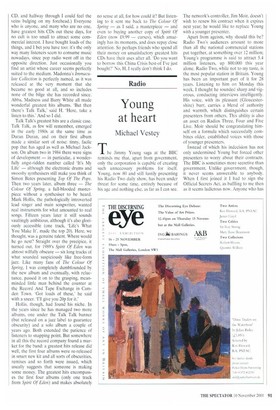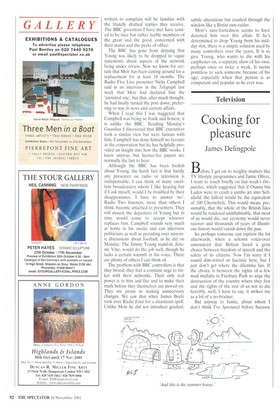Young at heart
Michael Vestey
The Jimmy Young saga at the BBC reminds me that, apart from government, only the corporation is capable of creating such unnecessary problems for itself. Young, now 80 and still lustily presenting his Radio Two daily show, has been under threat for some time, entirely because of his age and nothing else, as far as I can see.
The network's controller, Jim Moir, doesn't wish to renew his contract when it expires next year; he would like to replace Young with a younger presenter.
Apart from ageism, why should this be? Radio Two's audiences amount to more than all the national commercial stations put together, at something over 12 million; Young's programme is said to attract 5.4 million listeners, up 800,000 this year alone. Radio Two, while not to my taste, is the most popular station in Britain. Young has been an important part of it for 28 years. Listening to him on Monday this week. I thought he sounded sharp and vigorous, conducting interviews intelligently. His voice, with its pleasant (Gloucestershire) burr, carries a blend of authority and warmth, which distinguishes certain presenters from others. This ability is also an asset on Radios Three, Four and Five Live. Moir should be congratulating himself on a formula which successfully combines older, established voices with those of younger presenters.
Instead of which his indecision has not only undermined Young but forced other presenters to worry about their contracts. The BBC is sometimes more secretive than government. Unlike government, though, it never seems answerable to anybody. When I first joined it I had to sign the Official Secrets Act, as baffling to me then as it seems ludicrous now. Anyone who has written to complain will be familiar with the blandly drafted replies they receive. The BBC governors I have met have tended to be nice but rather feeble members of the great and the good, concerned with their status and the perks of office.
The BBC has gone from denying that Young was likely to be dropped to vague statements about aspects of the network being under review. Now we know for certain that Moir has been casting around for a replacement for at least 18 months. The Radio Five Live presenter Nicky Campbell said in an interview in the Telegraph last week that Moir had declared him the 'anointed one', but that, after much thought, he had finally turned the post down, preferring to stay in news and current affairs.
When I read this I was staggered that Campbell was being so frank and honest; it is unlike the BBC. Reading Monday's Guardian I discovered that BBC executives took a similar view but were furious with him. Campbell has done himself no favours at the corporation but he has helpfully provided an insight into how the BBC works. I knew anyway, but licence-fee payers arc normally the last to hear.
Although the BBC has been foolish about Young, the harsh fact is that hardly any presenter on radio or television is indispensable. I can think of many excellent broadcasters whom I like hearing but if I ask myself, would I be troubled by their disappearance, I have to answer `no'. Radio Two listeners, more than others I think, become attached to presenters. They will mourn the departure of Young but in time would come to accept whoever replaces him. Campbell sounds very much at home in his studio and can interview politicians as well as presiding over moronic discussions about football, as he did on Monday. The Jimmy Young stand-in, Jeremy Vine, would do the job well, though he lacks a certain warmth in his voice. There are plenty of others I can think of.
The problem with BBC controllers is that they brood; they feel a constant urge to tinker with their networks. Their only real power is to hire and fire and to make their mark before they themselves are moved on. They are prone to making unnecessary changes. We saw that when James Boyle took over Radio Four for a disastrous spell. Unlike Moir he did not introduce gradual, subtle alterations but crashed through the window like a Birtist ram-raider.
Moir's sure-footedness seems to have deserted him over this affair. If he's determined to drop Young from his midday slot, there is a simple solution used by many controllers over the years. It is to give Young, who wants to die with his earphones on, a separate show of his own, perhaps once or twice a week. It seems pointless to sack someone because of his age; especially when that person is as competent and popular as he ever was,















































































































 Previous page
Previous page